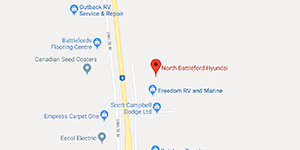Everything You Need to Know About Leasing or Financing a Used Car

Buying a new car can be a hefty investment. And while going the pre-owned route can offer considerable savings, it’s likely you’ll still need to take out a car loan to front the overall cost. Financing and leasing a vehicle offers many advantages, and it’s typically more advisable than paying for a vehicle in cash in full. Not only does it allow for lower upfront costs and help build your credit, but it also significantly increases your chances of getting a high-quality vehicle that will last. Still, the financing process can be a bit complex for those with little experience in banking and finance, as well as first-time buyers. Here at North Battleford Hyundai, we’re committed to making it easy for our customers to get approved for affordable financing with terms and rates that align with any budget. But first, let’s help you get the jargon down so you can walk into a dealership as prepared as possible!
The Variables
When it comes to calculating your car payments, there are several key factors to consider. Understanding these factors is crucial in making informed decisions when it comes to financing or leasing a vehicle
- Total Cost: This includes the purchase price of the vehicle, any applicable service fees (which should be clearly disclosed), and optional add-ons you may choose for your vehicle.
- Loan Terms: The terms of the loan typically range from 2 to 6 years. Choosing a shorter loan term often means higher upfront costs but lower overall interest expenses.
- Interest Rate: The interest rate is the percentage charged by the lender for the loan. The specific interest rate depends on various factors, such as your credit score, income, existing debts, loan amount, and more. It's a reflection of the level of risk the lender assumes.
- Personal Credit and Financial Situation: Your financing options are greatly influenced by your credit score and overall financial situation. A wide range of loans and interest rates are available to individuals with different credit profiles, including those with good, bad, or limited credit history.
- Cash vs. Financing: While paying for a new car upfront eliminates the need for monthly payments, financing a vehicle allows you to pay less upfront and avoid tying up your savings in a single investment.
- Lenders and Repossession: Dealerships often work with various local lenders to offer competitive rates for individuals with different credit statuses. Lenders view vehicle financing as relatively low risk because they have the option to repossess the car in the event of non-payment.
Leasing Vs. Financing a Used Vehicle
Leasing and financing are two different methods for acquiring a vehicle, and they come with distinct features and considerations. The choice between leasing and financing depends on your personal preferences and financial situation. Leasing is often a better option if you like driving a new car every few years and prefer lower monthly payments. Financing is a more suitable choice if you want to own the vehicle, have no mileage restrictions, and build equity over time. It's important to carefully assess your budget and needs to determine which option aligns with your lifestyle and financial goals.
Leasing a Vehicle:
- Ownership: When you lease a vehicle, you do not own it. Instead, you have the right to use the car for a specified period, typically 2 to 4 years.
- Payments: Lease payments are generally lower than loan payments because you're only paying for the vehicle's depreciation during the lease term, plus interest and fees.
- Mileage Limits: Lease agreements often come with mileage limits. Exceeding these limits can result in additional charges.
- Maintenance: You are typically responsible for routine maintenance and repairs, but some maintenance may be covered under warranty.
- End of Lease: At the end of the lease term, you can return the vehicle or purchase it at its predetermined residual value. You may also have the option to lease a new vehicle.
- Customization: Modifications or customizations are generally limited because you must return the car in good condition at the end of the lease.
Financing a Vehicle (Auto Loan):
- Ownership: When you finance a vehicle with an auto loan, you own the car outright once the loan is paid off.
- Payments: Loan payments cover the entire cost of the vehicle plus interest and fees. Monthly payments are often higher than lease payments.
- Mileage and Usage: There are no mileage limits, and you can use and customize the vehicle as you see fit.
- Maintenance: You are responsible for all maintenance and repairs, although you may choose to purchase an extended warranty.
- End of Loan: Once the loan is paid off, you have no further monthly payments, and you can keep the vehicle for as long as you want. You can also sell it or trade it in at any time.
- Equity: Over time, as you pay down the loan, you build equity in the vehicle. This means you have an asset with value once the loan is fully repaid.
Get Approved for a Car Loan in SK at North Battleford Hyundai
Here at North Battleford Hyundai, we’re passionate about not only helping our customers drive away in the vehicle of their dreams but also about offering guidance to our community about all things financing. As a trustworthy dealership serving the folks of North Battleford, Kindersley, Rosetown, and all over Southern Saskatchewan, we’re always on standby to answer any questions you may have about financing. Contact us to get approved, or get started by browsing our used inventory today!
Hours of operation
Mon 8am - 6pm
Tues 8am - 6pm
Wed 8am - 6pm
Thurs 8am - 6pm
Fri 8am - 6pm
Sat 9:30am - 4:30pm
Sun Closed







